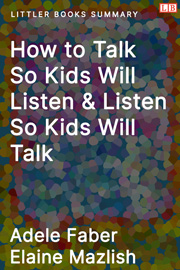Book Description
A practical guide to making your family life less stressful and more rewarding.
If You Just Remember One Thing
Coming soon.
Bullet Point Summary and Quotes
- To change a child's behavior, acknowledging their feelings is essential. Often, kids misbehave because their feelings are not being heard, and it's important to address them. Ignoring a child's emotions can lead to tantrums and frustration. Acknowledging their feelings by listening and responding appropriately can de-escalate the situation.
- Example: “You must be feeling very hungry. You haven't eaten in a while now. I wish I could magically make a hot dog for you right now.”
- It's crucial to be genuine in your response and not dismissive, as children will be able to tell if you're not truly listening.
- When the child is misbehaving, do not resort to demands, threats, or sarcasm, as they'll worsen the situation. Instead, explain to your child why should behave differently. This will assuage the situation and also empower your child with information so that she can make better decisions willingly on her own.
- Example: “When you stay up past your bedtime you will feel very tired the next morning. Then you won't be able to stay awake and have any fun at school.”
- Do not punish your children for bad behavior. Punishment leads to resentment, and more importantly, it does not teach children why what they did was wrong. If they stop the bad behavior, it will be for the wrong reasons.
- Instead of punishment, have a dialogue with them to understand each other's needs and feelings, then brainstorm together to find mutually acceptable solutions. By doing so, you show that the child's opinions are valued. This can help your child think independently about their behavior and come to a mutual agreement.
- Example: “When you come home late I get worried about your safety. I need to know you're okay because I care about you. What do you think about sending me periodic updates to assure me that you're safe, if you must stay out late?”
- Encourage your children's independence by letting them make their own choices and seek advice from others. If you allow them to become too dependent on you, they might grow up feeling helpless and worthless, which leads to belligerence and frustration.
- It may be uncomfortable to watch your child struggle as they find their autonomy. It's important to resist the urge to always step in and save them. By doing so, you're allowing them to grow and become self-sufficient individuals who can make their own decisions. Remember to have patience and let them explore and learn for themselves.
- Encourage your children with praises to boost their confidence and self-esteem. Be genuine and specific with your praises so that they don't feel manipulative or fake.
- Example: Instead of “Nice drawing!”, try “I'm very impressed by your drawing. I especially like how you filled in the colors with lines.”
- It is crucial that you don't label your child. Labels are limiting and may cause a child to adapt to the label. If you label your child as violent, she may become more violent. If you call her stubborn, she will happily continue to be stubborn. If you tell her that she's a slow learner, she'll accept that as the permanent truth and underperform in school.
How to Talk So Kids Will Listen & Listen So Kids Will Talk: Resources
- Download this summary and 173+ other top nonfiction book summaries in one book (PDF, eBook, DOCX)
- Buy the book
